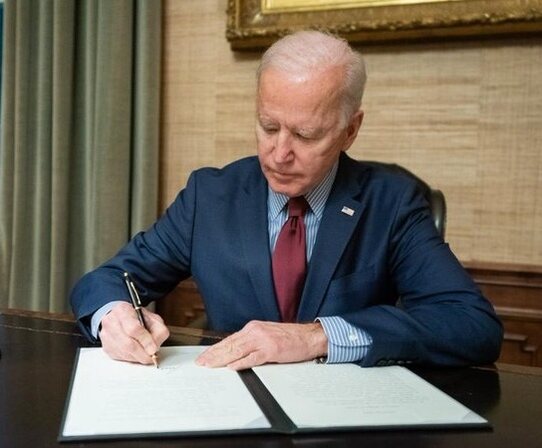US President Joe Biden’s administration indicated on Saturday that it plans to extend additional support to India in the war against Covid-19. But the litmus test of its intention lies in whether it will lift the ban on the export of raw materials for the AstraZeneca vaccine being manufactured by the Serum Institute of India.
"We are in active conversations at high levels and plan to quickly deploy additional support to the Government of India and Indian health care workers as they battle this latest severe outbreak. We will have more to share very soon," Reuters news agency cited a White House spokeswoman as saying via email.
The United States is deeply concerned by a massive surge in coronavirus cases in India and will race additional support to the Indian government and health care workers, the spokeswoman.
However, the Biden administration has been dragging its feet on lifting the raw materials export ban at a time when India is grappling with a second devastating wave of the coronavirus pandemic.
Washington was expected to do much more for India, especially considering that the country is the world's largest democracy and a strategic ally in the US efforts to counter China.
State Department spokesperson Ned Price had bluntly said on Friday that the US has to first to take care of the requirements of its own people, in response to a question from a journalist on the requests made from India to lift the ban. "We have a special responsibility to the American people,” Price said.
India's External Affairs Minister S. Jaishankar had discussed the issue with US Secretary of State Anthony Blinken last week and this had raised hopes that Washington would lift the ban to allow the export of vaccine raw materials. But this has not happened.
Jaishankar confirmed last week that the government was trying to address the raw materials matter but that it was important for India to meet its export commitments too.
"I am pushing other countries, particularly some big countries, saying 'Look, please keep the raw materials flowing for the vaccines to be made in India'," he said, without naming any country.
"Can I … go around the world and tell people 'Guys keep your supply chain flowing towards me … but I am not going to give you the vaccine?'"
Washington has invoked the Defense Production Act to preserve vaccine raw materials for its own companies, but the Serum Institute of India (SII), the world's biggest vaccine maker, has said this went against the global goal of sharing vaccines equitably.
India has also become the world's main supplier of vaccines and has been exporting both the AstraZeneca as well as its homegrown Covaxin vaccine developed by the Indian Council of Medical Research and Bharat Biotech.
Indo-Pacific Quad vaccine pact
Ned Price also said, "When it comes to India, there is the arrangement with the Quad which includes increasing production capacity in India."
He was referring to the Indo-Pacific Quad summit attended by US President Joe Biden and Prime Ministers Narendra Modi of India, Yoshihide Suga of Japan and Scott Morrison of Australia. The summit had agreed on an arrangement for vaccines to be manufactured by India with US and Japanese funding and Australia pitching in with logistics under the programme.
Under the Quad arrangement, Washington is keen to promote the Johnson & Johnson vaccine and the Novavax vaccine as both have been developed by US pharma giants.
Officials from both countries are engaged at various levels to ensure a smooth supply of inputs and components from U.S. companies for production of COVID-19 vaccines in India, according to a spokesman at the Indian Embassy.
However, it now remains to be seen whether the vaccine raw materials for AstraZeneca-Oxford vaccine come through as India, with a population of 1.3 billion, is set to accelerate its inoculation drive from May 1 to cover all adults in the country.
Pune-based SII produces the bulk of the vaccines in India, at around 65 to 70 million doses a month, and production has been hit as the US has imposed a ban on the raw materials.




















